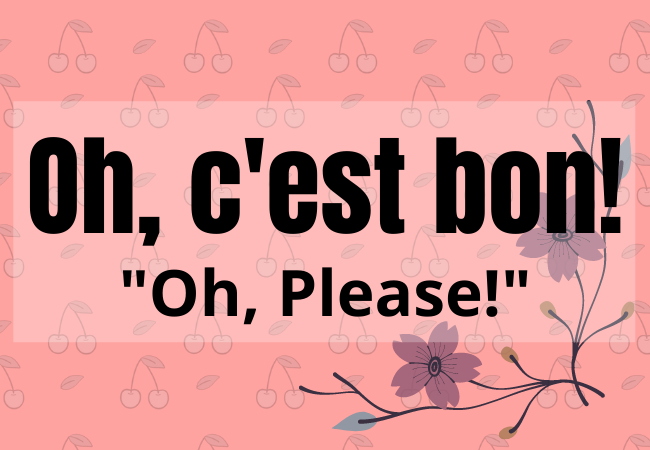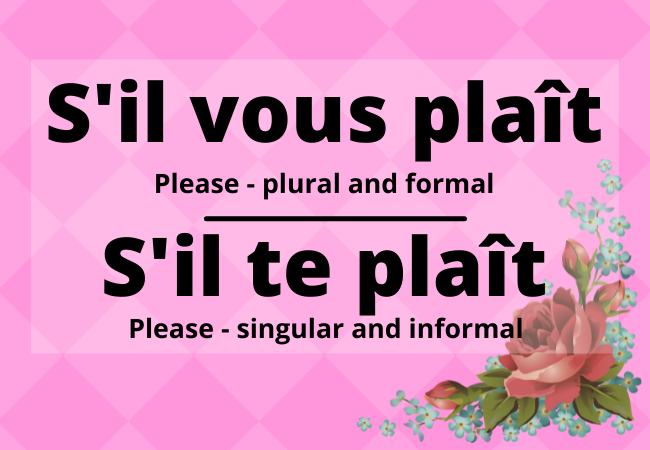In French, the two most common ways to say please are: s’il vous plaît (pronounced s-il vu plɛ or “seel voo play”) and s’il te plaît (pronounced s-il tə plɛ or “seel tuh play”). This article will explore many more ways of how to say please in French. Listen to the audio and repeat!
s’il vous plaît
please – plural and formal
s’il te plaît
please – informal

S’il vous plaît – Please In French
S’il vous plaît and s’il te plaît pronunciation
The pronunciation of s’il vous plaît (formal and plural please) is “seel voo play”. The pronunciation of s’il te plaît is “seel tuh play”.
What is the literal translation of s’il vous plaît?
In French, “s’il vous plaît” comes from the verb “plaire“, which means to please. The literal translation of “s’il vous plaît” is “If it please”.
The difference between the “vous” and “te” in “s’il vous plaît” and “s’il te plaît” is that “vous” is formal and “te” is informal for “to you“.
What are some different ways to say please in French?
In addition to s’il vous plaît, here are several other ways to say please in French.
Veuillez
Veuillez is the imperative (command) of the verb vouloir (to want) in the second-person plural (vous) form. In formal language, veuillez is followed by an infinitive to mean please.
Veuillez is often seen on signs. For example:
Veuillez attendre ici.
Please wait here.
Merci de
Merci de is an another formal way of saying please when giving a polite command. The grammatical structure is: Merci de + infinitive. For example, on websites or surveys you may see:
Merci de commenter.
Please comment.
Prière
Prière is a polite way to say please. The grammatical construction is: “Prière de + infinitive”. For example, on a sign you may see:
Prière de fermer la porte.
Please close the door.

Je vous en prie
“Je vous en prie” translates literally to “I beg of thee”. It can be followed by “de” plus infinitive to mean please in formal letter writing.
Je vous prie de trouver ci-joint.
Please see attached.
Vous êtes priés
“Vous êtes priés” is another formal way to say please which translates literally to “You are begged to”. The grammatrical structure is: “Vous êtes priés de + infinitive”.
For example, in a hotel you may see a sign that says:
Vous êtes priés de fermer la porte avant de partir.
Please close the door before leaving.
Oh, c’est bon
“Oh, c’est bon” is an interjection that means “Please!” when expressing indignation. For example:
Oh, c’est bon! J’en ai assez de cette situation!
Please! I’ve had enough of this situation!
Other expressions which can be used for “Please!” in this context of indignation are “Ça suffit !”, which translates to “That’s enough!” and “Non mais arrête !”, which translates literally to “No but stop!”.
Ça suffit !
That’s enough!
Non mais arrête !
Stop!

Voudriez-vous, pourriez vous
Voudriez-vous and pourriez-vous do not mean please per say, but are used with please to make polite requests.
“Voudriez-vous” translates to “would you” and is the second-person plural (vous) form of the verb vouloir (to want) in the conditional tense.
“Pourriez-vous” translates to “could you” and is the vous form of the verb pouvoir (can, able to) in the conditional tense.
Voudriez-vous and pourriez-vous are used to make polite requests. For example:
Voudriez-vous m’aider, s’il vous plaît?
Would you help me, please?
Pourriez-vous m’aider, s’il vous plaît.
Could you help me, please?
How do you say, “Yes, please”?
When being offered something, there are three main ways to say “yes, please!”. All three are equally acceptable and show a high level of respect.
For example, if asked “Voulez-vous un café?” (Would you like a coffee?), you can answer with:
Oui, volontiers!
Yes, please! (Liter translation: Yes, gladly!)
Oui, avec plaisir!
Yes, please! (Literal translation: Yes, with pleasure!)
Oui, merci!
Yes, please! (Literal translation: Yes, thank you!)
Is there a way to say “pretty please”?
In English, the expression “pretty please” is used to beg or cajole. The full English expression is: “Pretty please with sugar on top”.
French does have a version of “pretty please”. The informal “s’il te plaît” is shortened to “s’te plaît”. The “il” is omitted to make a kind of cutesy language. In the audio below the formal vous form is used as some kinds may use vous with their parents.
Papa, est-ce que je peux avoir une glace? S’il vous plaît, s’il vous plaît!
Daddy, can I have an ice cream? Pretty please?


